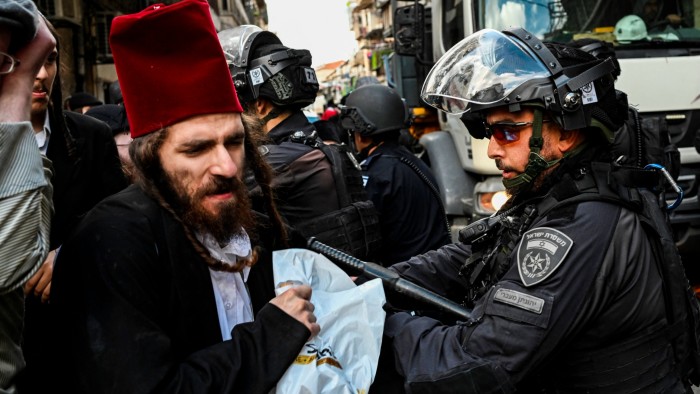Ultra-Orthodox Exemption from Military Service in Israel: A Controversial Issue
The exemption of ultra-Orthodox (Haredi) Jews from mandatory military service in Israel has become a contentious and divisive topic in Israeli society. While secular Israelis are required to serve nearly three years in the army, the exemption allows thousands of ultra-Orthodox men to continue their full-time study of Jewish scriptures at seminaries called yeshivas.
However, as the war in Gaza continues and the number of soldiers killed in combat rises, the exemption has sparked anger and a growing determination among secular Israelis to change the status quo. Secular parties argue that the burden of military service should be shared equally among all citizens, while some religious radicals have even threatened civil disobedience and a war against the state if forced to serve.
Political Divisions and Legal Challenges
The issue has intensified political divisions in Israel. The Supreme Court recently issued an interim order freezing state subsidies to ultra-Orthodox students eligible for conscription, triggering strong reactions from the Haredi community, who fear it may be a precursor to a full draft. On the other hand, secular groups welcome the decision, viewing it as a step towards equal burden-sharing.
Legal challenges to the exemption have been frequent, with the Supreme Court upholding one such challenge in 2017. However, successive governments have delayed implementation in an attempt to find a compromise. The latest delay is set to expire soon, and failure to find a solution may lead to the collapse of Benjamin Netanyahu's government.
Delicate Balancing Act for Netanyahu
Prime Minister Benjamin Netanyahu faces a difficult dilemma. Scrapping the exemption may lead to the Haredi parties withdrawing their support, while preserving it risks losing the support of centrists who advocate for its abolition. A collapse of the coalition could potentially trigger new elections, which current polls suggest Netanyahu would lose.
Netanyahu has been avoiding making a final decision, but the recent Supreme Court order indicates that the judges are growing impatient with his indecision. Finding a solution that satisfies all parties involved will test his political acumen and survival skills.
Perspectives from the Haredi Community
Ya'akov Cohen, a student at the Beit Matityahu yeshiva in Bnei Brak, argues that secular people fail to recognize the unique contribution that Haredi scholars make to society through their devoted study of Torah. He emphasizes their sacrifices and explains that they could pursue lucrative careers but choose to prioritize their religious studies instead.
Cohen denies the perception that the Haredim lack solidarity with other Israelis, stating that they pray for the soldiers three times a day and deeply respect their sacrifices. He believes that their prayers contribute to the Israeli war effort, as Haredim believe in the powerful force of the Torah.
The Historical Context and Current Challenges
The exemption of ultra-Orthodox Jews from military service has its roots in a deal struck by Israel's founder, David Ben-Gurion, in the early days of the state. The agreement allowed 400 yeshiva students to focus on full-time Torah study in exchange for their support of the Zionist project. However, the Haredim now make up 13% of Israeli society, and many Haredi men receive government stipends to study Torah rather than pursuing paid employment.
Critics argue that the economic sustainability of this arrangement is questionable, considering the rapid growth of the ultra-Orthodox population. However, Israel Cohen, a Haredi broadcaster and commentator, explains that the draft issue is fraught for Haredi rabbis who seek to shield young men from the temptations of secular society and preserve the community's traditional way of life.
The Possibility of Compromise
Eliezer Hayun, a researcher at Tel Aviv University, suggests that a potential compromise could involve enlisting young Haredi men who are formally enrolled in yeshivas but do not attend lessons. Another option could be allowing these men to serve within their own communities, such as in religious charities or Haredi hospitals.
However, finding a compromise may prove challenging due to the religious significance of the issue for Haredi rabbis. They view it not only as a cultural matter but also as a religious one, with potential consequences in the afterlife if they compromise their principles.



